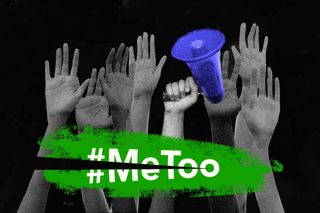
The Johnny Depp Defamation Verdict Becomes a Precedent for Survivors To Not Speak Up
The verdict does irreversible damage to MeToo by severing the right to speak publicly, setting a dangerous precedent for victims of abuse.

On the morning of June 2nd, social media is role-playing as witness to a war hero coming home. Actor Johnny Depp is “victorious against Amber Heard,” one article noted; legions of Depp fans congregate in comment sections and march with nifty hashtags to “celebrate” Depp’s legal redemption. “Yes, he did it.”
The Amber Heard-Johnny Depp trial, one of the rare instances of high-profile #MeToo charges unfolding in a crass, bright public spotlight of a courtroom, finally reached a verdict on Wednesday. The jury ruled that both Depp and Heard defamed each other. It began with the contention that Amber Heard defamed Depp in a Washington Post article, where she spoke of her experience of abuse without naming the perpetrator. The 2018 article, Depp maintained, cost him millions in professional damage and an unquantifiable amount in social prestige. He was awarded $10 million in compensatory damages and $5 million in punitive damages. On her part, Heard was awarded $2 million as compensation for defamation by one of Depp’s lawyers; he accused her of creating a ruse to make the actor look guilty of violence.
The verdict of the case is important on many accounts, not least due to the precedent it serves. In the article that has since been eclipsed in legalities, Heard wrote: “For months, I rarely left my apartment, and when I did, I was pursued by camera drones and photographers on foot, on motorcycles and in cars,” she said. “Tabloid outlets that posted pictures of me spun them in a negative light. I felt as though I was on trial in the court of public opinion – and my life and livelihood depended on myriad judgments far beyond my control. I spoke up against sexual violence — and faced our culture’s wrath. That has to change.”
This is the locus of the defamation suit that has since played out in courts. The six-week-long courtroom trial that transfixed people was a legal battle with no well-defined perpetrator or victim, but it does cast a shadow on how, and what, victims of intimate partner violence can say when they speak up. The takeaway from the current verdict is grim: no victim of intimate partner violence can safely talk about violence in the media, because their abuser can simply sue them.
The verdict exposes the invisible nexus of power and manipulation that powers defamation suits linked to abuse and violence. They double as a bogeyman unleashed on survivors who use the public arena for giving air to their trauma. Importantly, Heard never named Depp in her piece; she merely spoke of her own experience. The vitriolic, heavily publicized trial was a result of just articulating a personal experience of violence. What’s more is that Depp already lost a defamation suit when he was named a “wife-beater” by a U.K. tabloid — the court, in that instance, established that it did not amount to defamation if it was true.
India is no stranger to this story; in one instance, journalist Priya Ramani was served with defamation in 2018 when she publicly named M.J. Akbar as a sexual harasser in an essay. Akbar had contended that Ramani’s statements sullied his “stellar reputation,” and went on to file a criminal defamation suit against Ramani (Ramani was acquitted last year, but the case has since been re-visited in the court of law).
Ever since #MeToo paved the way for holding people accountable where the law failed, high-profile men accused of gender-based assault or violence have leveraged defamation suits against survivors. Then, and now, the pattern echoed what happened to survivors who spoke up, with defamation suits and legal obstacles deterring people from speaking up. This is not to equate Depp with Akbar, or any one individual with the other. The lines are grayer and much more hazy in any case of intimate partner violence, more so now. What is clear though is it’s worryingly possible to stowspeech and experiences of gender abuse behind ruinous defamation suits — foreclosing the one avenue that survivors have to speak about their experiences.
Related on The Swaddle:
The Johnny Depp‑Amber Heard Trial Bolstered Meme Pages as the New Mass Media
The verdict does irreversible damage to #MeToo’s legacy. The phenomenon of speaking out hinged on the public platform as a necessity; the public name was indeed central to the functioning of #MeToo movement that allowed people to speak up. In the Indian context, this public naming started with Raya Sarkar’s List of Sexual Harassers in Academia (LoSHA) — a stir that made public assertions of abuse and violence a catalyst to inching, in some ways, toward justice.
“From a #metoo standpoint, it’s … bad and dangerous,” said law professor Susan Seager, a legal expert who spent decades representing media organizations. “I just think that sends a bad signal to men and women or whoever is the abuser that, you know, you just can sue your victim and ruin them by bringing them to court for a defamation case.” Violence exists in the context of power and status; it is this power vacuum that is used to discredit or silence survivors.
The message then is those with social and monetary prestige can use structural means to hire a defamation lawyer and take one to court — and make them defend their innocence — for speaking up against violence. Activists have long warned how defamation suits are weaponized to deny victims the right to name people for alleged sexual abuse. When the courts become a space to punish survivors themselves, it further victimizes others from coming forward. A report by Equality Now found a global rise in the prevalence of this tactic: defamation lawsuits were being increasingly around the world as a way to retaliate against and silence victims and survivors who speak out about their own abuse.
MeToo’s legacy is also built on the way it unraveled the idea of the perfect victim and displayed the gaping hollowness within. There is no moral absolute in the way a person experiences, reports, and deals with abuse; the conclusion drawn is pithy and pertinent: no one is a perfect victim. “…it also showed the other side of the coin: that there is no such thing as the ‘perfect’ perpetrator,” Rohitha Naraharisetty wrote in The Swaddle. “It [MeToo]unpacked racist, casteist, and classist stereotypes of the stranger in the street mythology, showing how great men of standing can and very often do stoop to commit acts that belie their public appearances.”
The Heard-Depp trial revived the myth of the infallible abuse survivor. To Heard detailing her agonizing experiences, people reacted by calling her a “Drama queen”; when she cried, comment sections flooded with derisive statements like “Crocodile tears let’s goooo,” coupled with laughing emojis streaming on live chat. The anti-Heard sentiment was built not only on pedestalizing Depp, but also capitalizingon the rich currency of shaming and humiliating the victim of violence. It will soon be cool to deride people for being “an Amber,” the “crazy ex” who spoke of abuse, as some perverse form of “celebrating” Depp’s victory.
The truth of the matter is forever lost. What’s worse is that it threatens the survival of several other truths that lie within people, who watch the verdict play out, who watch the court of law and public opinion penalize a victim of violence from speaking freely. This is a dismissal not only of abuse, but of personhood and rights.
The microcosm of social media, meme pages, and reel videos has spelled the modern history of the Heard-Depp trial; in part conflating and muddying the realities of abuse. Perhaps only the discerning eye can interpret this legacy for what it is: one of treating gender abuse with ridicule and irreverence, and confining speech behind legal barbs. The moment in time may be one of mislaid celebration, barely couching their misogyny.
Saumya Kalia is an Associate Editor at The Swaddle. Her journalism and writing explore issues of social justice, digital sub-cultures, media ecosystem, literature, and memory as they cut across socio-cultural periods. You can reach her at @Saumya_Kalia.
Related


The ‘Mona Lisa’ Was Smeared With Cake As a Mark of Protest
